|
|
|
Sort Order |
|
|
|
Items / Page
|
|
|
|
|
|
|
| Srl | Item |
| 1 |
ID:
130331
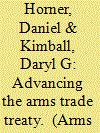

|
|
|
|
|
| Publication |
2014.
|
| Summary/Abstract |
Thomas Countryman took office as assistant secretary of state for international security and nonproliferation on September 27, 2011. He joined the U.S. Foreign Service in 1982. He was lead negotiator for the United States in the talks that produced the Arms Trade Treaty (ATT) last year. Arms Control Today spoke with Countryman in his office on March 12. Countryman was joined by William Malzahn, senior coordinator in the Office of Conventional Arms Threat Reduction. In the interview, Countryman explained the reasons that the United States signed the ATT, addressed domestic criticism of the pact, and looked ahead to the challenges that the treaty faces.
|
|
|
|
|
|
|
|
|
|
|
|
|
|
|
|
| 2 |
ID:
132781
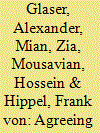

|
|
|
|
|
| Publication |
2014.
|
| Summary/Abstract |
Iran is negotiating with a group of six states over the future of its nuclear program. In November 2013, Iran and the P5+1 (China, France, Germany, Russia, the United Kingdom, and the United States) agreed to a Joint Plan of Action that seeks to reach a "comprehensive solution" by July 20, 2014.
The goal is an agreement on a set of measures that can provide reasonable assurance that Iran's nuclear program will be used only for peaceful purposes and enable the lifting of international sanctions imposed on Iran over the past decade because of proliferation concerns.
A key challenge is to reach agreement on limiting Iran's uranium-enrichment program, which is based on gas centrifuges, in a way that would enable Iran to meet what it sees as its future needs for low-enriched uranium (LEU) fuel for nuclear research and power reactors while forestalling the possibility that this program could be adapted to quickly produce highly enriched uranium at levels and in amounts suitable for use in nuclear weapons
|
|
|
|
|
|
|
|
|
|
|
|
|
|
|
|
| 3 |
ID:
130897
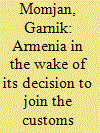

|
|
|
|
|
| Publication |
2014.
|
| Summary/Abstract |
I will speak about the situation in Armenia. On September 3, 2013 at the meeting with President Putin in Moscow, our President Serzh Sargsyan announced that Armenia would join the custom union. This statement echoed all over the world : in the evening, all leading information agencies and the media - BBC, Euronews and the Wall Street Journal were discussing it; they concluded that Russia had put pressure on Armenia.
|
|
|
|
|
|
|
|
|
|
|
|
|
|
|
|
| 4 |
ID:
127862
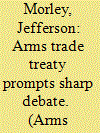

|
|
|
|
|
| Publication |
2013.
|
| Summary/Abstract |
A senior State Department official last month defended the Arms Trade Treaty, signed by the U.S. government in September, after 50 senators wrote to President Barack Obama saying they would oppose the pact. In the Oct. 15 letter, the senators charged that the treaty undermines U.S. credibility, threatens the rights of gun owners, and impinges on U.S. sovereignty. The lawmakers said they "cannot give [their] advice and consent to this treaty" and "do not regard the U.S. as bound to uphold its object and purpose."
|
|
|
|
|
|
|
|
|
|
|
|
|
|
|
|
| 5 |
ID:
131843


|
|
|
|
|
| Publication |
2014.
|
| Summary/Abstract |
As relations between Japan and China change due to a paradigm shift that has occurred over the past few years, the need for a new security outlook and world view has emerged. In East Asia, the foundation for the relationship between Japan and China must be fairness and justice, and the rule of law. This article proposes ways that Japan and China can work to cultivate common ground that would bring forth the possibility of a new Japan-China relationship based on the "strategic reciprocal relationship" established in 2006.
|
|
|
|
|
|
|
|
|
|
|
|
|
|
|
|
| 6 |
ID:
130702
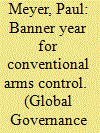

|
|
|
|
|
| Publication |
2014.
|
| Summary/Abstract |
THE CONTROL OF CONVENTIONAL ARMS HAS OFTEN SEEMED THE POOR COUSIN of the global efforts to control weapons of mass destruction (WMD). Since the advent of the atomic era, the focus of arms control and disarmament activity has been overwhelmingly on nuclear weapons and their lesser, if still ugly, stepsisters of biological and chemical weapons. The initial multilateral arms control agreements concerned themselves with limits on the testing of nuclear weapons and, shortly thereafter, with their nonproliferation (e.g., the Nuclear Nonproliferation Treaty of 1968). Bilateral US-Soviet/Russian arms control arrangements also predominantly dealt with the reduction of strategic nuclear forces and restraints on deployments of defenses against (nuclear tipped) ballistic missiles. Efforts to reduce major conventional weapon systems were also taken up in the 1980s in the context of negotiations
between the opposing alliances of NATO and the Warsaw Pact, eventually culminating in the Treaty on Conventional Forces in Europe (CFE Treaty) of 1989. This treaty provided for a massive reduction in the conventional forces that had confronted each other for years in Central Europe and established a new, far more stable security order on the continent. Even the CFE Treaty, however, tended to be overshadowed by other major disarmament agreements concluded in those heady post-Cold War days: the Intermediate Nuclear Forces Treaty (1987), Chemical Weapons Convention (1993), Comprehensive (Nuclear) Test Ban Treaty (1996), and various US-Russian bilateral strategic nuclear arms accords of the 1990s and early 2000s (e.g., the Strategic Arms Reduction Treaty and the Strategic Offensive Reductions Treaty).
|
|
|
|
|
|
|
|
|
|
|
|
|
|
|
|
| 7 |
ID:
135675
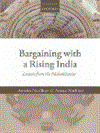

|
|
|
|
|
| Publication |
Oxford, Oxford University Press, 2014.
|
| Description |
238p.Hbk
|
| Contents |
Includes bibliographical references and index
|
| Standard Number |
9780199698387
|
|
|
|
|
|
|
|
|
|
|
|
Copies: C:1/I:0,R:0,Q:0
Circulation
| Accession# | Call# | Current Location | Status | Policy | Location |
| 058065 | 337.54/NAR 058065 | Main | On Shelf | General | |
|
|
|
|
| 8 |
ID:
125004
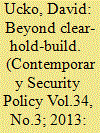

|
|
|
|
|
| Publication |
2013.
|
| Summary/Abstract |
Despite a highly uneven track record, clear-hold-build has remained a dominant, even universal, approach to counterinsurgency. Its prevalence is rooted in its incontestable sequencing of operations and the attendant promise of a linear path towards peace. Yet the appeal of this approach also makes it deceptive and possibly dangerous. Clear-hold-build is not a strategy and must not be mistaken for one, as it has been in Afghanistan, where it inspired false hope for swift progress. Instead, it is necessary to reach a more problematized view of this approach and of what it aims to achieve. This article provides such an evaluation, proposing five principles that should guide its future application. These principles point to the need for a far deeper understanding of how security, development, and governance interact at the local level. Counterinsurgents must understand the relationships between aid and security, between government and governance, and between state and periphery. Where the central government is predatory or lacks support, clear-hold-build also raises difficult questions of authority, legitimacy, and control - questions that counterinsurgents must be capable of answering. Thus problematized, clear-hold-build emerges as a framework with heuristic utility; a schema that can be helpful in planning but which must at the time of application be populated by knowledge, substance, and skill. The implications of these requirements are troubling, particularly for those governments still in the business of armed intervention.
|
|
|
|
|
|
|
|
|
|
|
|
|
|
|
|
| 9 |
ID:
124204
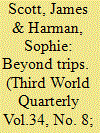

|
|
|
|
|
| Publication |
2013.
|
| Summary/Abstract |
The current round of World Trade Organization (WTO) negotiations-the Doha Round-has significant implications for global health which have received insufficient attention from the global health community. All too often the health implications of global trade agreements are examined only after their conclusion, and are concerned only with intellectual property rights. This paper seeks to move beyond this narrow focus and elucidate the wider health implications of the Doha Round. It explores the negative effect of the Round on state capacity to provide and regulate health services in low-income countries, and the impact it will have on livelihoods among the poor and their ability to access health services. Overall the paper makes the case for greater engagement from the health community with the wto and the Doha Round negotiations beyond the customary focus on intellectual property rights.
|
|
|
|
|
|
|
|
|
|
|
|
|
|
|
|
| 10 |
ID:
134079
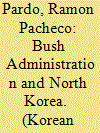

|
|
|
|
|
| Publication |
2014.
|
| Summary/Abstract |
Why did the George W. Bush Administration change its policy toward North Korea from confrontation to accommodation during the second nuclear crisis? This article answers the question by analyzing how and why a coalition-including Bush Administration doves, China, Russia, South Korea and, at times, Japan and North Korea-worked together to overcome the reticence of Bush Administration hawks to engage with Pyongyang. Building on the soft balancing, bureaucratic politics, and transgovernmental coalitions literature, this article explains how the Six-Party Talks served this coalition to understand the extent to which they shared goals and policies. Aware of the divisions within the Bush Administration regarding policy toward North Korea, the five other parties to the talks were able to undermine the preferred policies of U.S. hawks while supporting the policies of doves. Thus, rather than determining Washington's behavior, this coalition laid the ground for U.S. officials supportive of accommodation to upload their preferences into official Bush Administration's policy. This article therefore also sheds light on how soft balancing can be used by third parties to influence the decision-making process in the United States.
|
|
|
|
|
|
|
|
|
|
|
|
|
|
|
|
| 11 |
ID:
132032
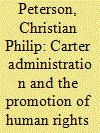

|
|
|
|
|
| Publication |
2014.
|
| Summary/Abstract |
This article will examine the effectiveness of the Carter administration's efforts to promote human rights in the Soviet Union. It will pay particular attention to how human rights promotion fit into a larger approach to transforming Superpower relations in ways favorable to U.S. interests called "reciprocal accommodation [détente]." The use of this framework provides an excellent way to tease out the complexities of how the administration balanced the promotion of human rights in the USSR with other important objectives such as concluding the SALT II treaty. It also helps reveal how executive branch worked to reduce Soviet human rights violations by citing the provisions of the Final Act and working with private citizens to raise international awareness about human rights issues. Without losing sight of his administration's inability to protect Soviet dissenters from arrest and harassment, this article will demonstrate that Carter had every intention of making the issue of human rights an important element of Cold War competition and implementing a new approach to détente that at least in part aimed at transforming Soviet internal behavior.
|
|
|
|
|
|
|
|
|
|
|
|
|
|
|
|
| 12 |
ID:
129104
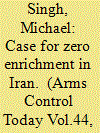

|
|
|
|
|
| Publication |
2014.
|
| Summary/Abstract |
In the debate over sanctions on Iran-their role in bringing Tehran to the negotiating table and their proper place in U.S. diplomatic strategy in the future-scant attention has been paid to a major shift in the negotiating position of the P5+1, the group of six countries (China, France, Germany, Russia, the United Kingdom, and the United States) that is negotiating with Tehran over the Iranian nuclear program. No longer is the P5+1 demanding that Iran halt uranium enrichment. Indeed, in the November 24 first-step nuclear accord, the Joint Plan of Action,[1] the P5+1 all but concedes that Iran will be permitted to enrich in perpetuity. In separate comments that have quickly become conventional wisdom among Iran analysts, U.S. negotiators now characterize their previous position that Iran should halt enrichment as "maximalist."[2] Although undoubtedly expedient, this shift away from a zero-enrichment negotiating position is misguided and unnecessary.[3] The U.S. shift away from zero enrichment to limited enrichment represents a significant diplomatic victory for Iran. For the last decade, the position of the EU-3 (France, Germany, and the UK) and then the P5+1 had been that Iran must "suspend all enrichment-related and reprocessing activities, including research and development." This position was enshrined as an Iranian obligation in a series of UN Security Council resolutions.[4] Iran, however, asserted a "right to enrich" and refused to halt enrichment after resuming it when nuclear talks with the European Union broke down in 2005. This difference formed the core of the confrontation that subsequently developed between Iran and the allies.
|
|
|
|
|
|
|
|
|
|
|
|
|
|
|
|
| 13 |
ID:
131594
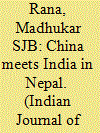

|
|
|
|
|
| Publication |
2013.
|
| Summary/Abstract |
This article attempts to conduct a comprehensive assessment of India and China's interests in Nepal in the wake of the drastic political Nepal since 2006. In this regard, the '6C- Frame of 1 as been employed in the context of Nepal, viz, 1) What are : interests of China and India?; it) What are their conflicting I) What are the areas of cooperation," (iv) What are the areas ' v) How do they diplomatically communicate their T vi) How do they diplomatically coordinate their interests cooperation and minimize con?ict?
|
|
|
|
|
|
|
|
|
|
|
|
|
|
|
|
| 14 |
ID:
127336
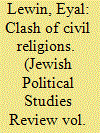

|
|
|
|
|
| Publication |
2013.
|
| Summary/Abstract |
Almost thirty-five years after Camp David and twenty years after the Oslo Accord, a fundamental question remains unanswered: does the majority of the Israeli public support a left-wing or right-wing ideology? The answer, in a democratic system, should be obvious, since elections are supposed to give a clear picture of the political preferences of the voting public. However, Israeli polls are misleading. After the Yom Kippur disaster in 1977, Menachem Begin won his premiership running as the hawkish leader who never would surrender even one grain of sand from the Land of Israel. Yet after he personally gave up the entire Sinai Peninsula his party won an even greater majority in 1981.1 Yitzhak Rabin won his premiership in 1992 representing the hawkish section of the Labor party with declarations that he would never negotiate with the PLO;2 yet it seems that signing the Oslo Accords led him, rather, to the peak of his popularit.
|
|
|
|
|
|
|
|
|
|
|
|
|
|
|
|
| 15 |
ID:
178457
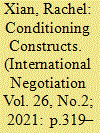

|
|
|
|
|
| Summary/Abstract |
Political psychology and social constructivism exist in an “ideational alliance” against realism; however, both have overlooked behavioral conditioning, the basis of animal learning. Through six stages situated in international negotiation behaviors, the theory of Conditioning Constructs shows how behavioral conditioning can take parties from specific to diffuse reciprocity, rationalist to constructivist cooperation, and crisis to durable peace. In stages 1, 2 and 3, parties use negotiated agreements to exit prisoner’s dilemmas, continuously reinforce cooperation during agreement implementation, and satiate to rewards as initial implementation finalizes. In stages 4, 5 and 6, parties receive fresh rewards with new negotiations, undergo intermittent reinforcement with periodic agreements thereafter, and finally attribute cooperative behavior to actor constructs. Conditioning Constructs demonstrates that agency is possible in socially constructed structures through willful participation in conditioning through negotiation; and that, while Anatol Rapoport’s tit-for-tat strategy is suited to initial cooperation, intermittent reinforcement better preserves late-stage cooperation.
|
|
|
|
|
|
|
|
|
|
|
|
|
|
|
|
| 16 |
ID:
127633
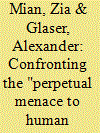

|
|
|
|
|
| Publication |
2014.
|
| Summary/Abstract |
Nuclear weapon states historically have attached great secrecy to their nuclear weapon and fissile material production programs and stockpiles, despite warnings that this would fuel fears, handicap informed debate and decision making, and drive arms races. As evidenced by the "Action Plan on Nuclear Disarmament" agreed upon at the 2010 Treaty on the Non-Proliferation of Nuclear Weapons (NPT) Review Conference, however, the international community now sees greater transparency about nuclear weapon and fissile material stocks as necessary for enabling and monitoring progress toward nuclear disarmament. To support this effort, the International Panel on Fissile Materials has proposed a step-by-step program for weapon states to declare their inventories, production histories, and disposition of nuclear warheads and fissile materials, and to set up joint projects to develop methods for verifying these declarations. This openness initiative is described here, and could be adopted at the 2015 NPT Review Conference, laying a basis for negotiating verifiable deep reductions in nuclear arsenals and their eventual elimination.
|
|
|
|
|
|
|
|
|
|
|
|
|
|
|
|
| 17 |
ID:
129103
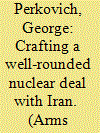

|
|
|
|
|
| Publication |
2014.
|
| Summary/Abstract |
A final nuclear deal with Iran should meet the underlying objective of the relevant UN Security Council resolutions since 2006: "the establishment of international confidence in the exclusively peaceful nature of Iran's nuclear programme."A final agreement could be codified and endorsed through a new resolution, which need not include all of the specific instrumental elements of past resolutions-for example, suspension of all uranium enrichment-if the council determines that the overall objective has been met. As the resolutions acknowledge, to be durable, such an agreement also must satisfy Iran's interest in having a purely peaceful nuclear program free from sanctions. The devilish challenge will be in the details. History will inform each party's requirements. The six-country group that has been negotiating with Iran, the so-called P5+1 (China, France, Germany, Russia, the United Kingdom, and the United States), will remember that Iran secretly had, at least until 2003, what appeared to be a dedicated, multifaceted program to acquire capabilities to produce nuclear weapons. Iran still has not cooperated fully with the International Atomic Energy Agency (IAEA) to clarify these activities and continues to expand sensitive fuel-cycle capabilities beyond any plausible civilian requirement. Iranian leaders, for their part, remember numerous episodes that reflect a U.S. determination to hasten an end to their regime.
|
|
|
|
|
|
|
|
|
|
|
|
|
|
|
|
| 18 |
ID:
090656
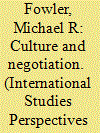

|
|
|
|
|
| Publication |
2009.
|
| Summary/Abstract |
This article examines one especially challenging aspect of active-learning international studies courses-the use of cross-cultural simulations. What is the significance of culture for negotiation? What difficulties might cross-cultural negotiations pose, and how might negotiators work with cultural differences to achieve successful outcomes? Is it possible to model the effects of cultures on negotiators in a classroom role-play? What are the advantages to using cross-cultural simulations, and what difficulties do they entail? How might an instructor make best use of materials that focus on cultural issues and their effect on negotiation? When teaching students of different cultures by active-learning methods, what ought an instructor to bear in mind? What cross-cultural simulations are available, and what readings might be assigned to accompany them?
|
|
|
|
|
|
|
|
|
|
|
|
|
|
|
|
| 19 |
ID:
129570
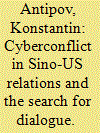

|
|
|
|
|
| Publication |
2014.
|
| Summary/Abstract |
The unprecedented escalation of conflict between China and the United States in cyberspace signals a definite crisis in Chinese-American relations. At the same time, the results from informal meetings between, Xi Jinping and Barak Obama in California on June8-9, 2013 show that the United States and China could possible move toward a new stage in their relations in the field of security.
|
|
|
|
|
|
|
|
|
|
|
|
|
|
|
|
| 20 |
ID:
127077
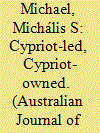

|
|
|
|
|
| Publication |
2013.
|
| Summary/Abstract |
Cyprus occupies an unenviable position among a group of intractable international conflicts which transcend their national borders and whose resolution has eluded third-party mediation. The Cyprus dispute has preoccupied theorists and practitioners of conflict resolution ever since the United Nations stationed its peacekeeping force on the island in 1964. Even attempts by the United Nations to revitalise the Cyprus talks following the 2004 referendum on the Annan plan have not yielded satisfactory results. For decades, the Cyprus problem has challenged conventional international analysis and defied traditional approaches to negotiation and peacemaking. This article grapples with the question of why this conflict has not been resolved despite endless negotiations. By extrapolating three seemingly distinct variables-Cypriotisation, Europeanisation and post-Kemalism-this article alludes to changes in the conflict's contextual parameters that are conducive to a political settlement.
|
|
|
|
|
|
|
|
|
|
|
|
|
|
|
|
|
|
|
|
|